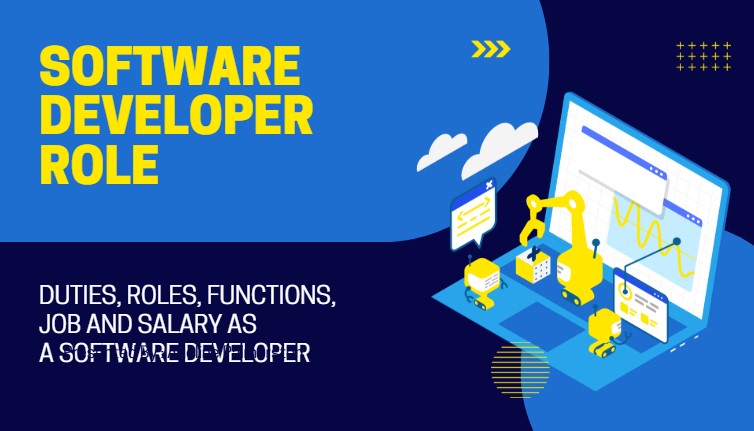Software developers create, refine, and evaluate software, applications, and computer systems across multiple industries. If you have a knack for problem-solving, strong analytical skills, and a creative mindset, this career may be an excellent choice for you. Explore career growth opportunities, key responsibilities, and job prospects in this guide.
What Are the Responsibilities of a Software Developer?
Software developers leverage their coding expertise to develop new software solutions and enhance existing applications. They craft and implement code for a wide range of programs, including operating systems, mobile apps, and video games.
As a software developer, you may engage in all phases of the Software Development Life Cycle (SDLC), from gathering user requirements and predicting user interactions to launching a finished product. You will likely collaborate with a team of developers, engineers, and programmers.
Read more: Software Developer vs. Software Engineer: Key Differences
Understanding Software Development
Daily responsibilities of software developers include:
- Assessing user requirements for software solutions
- Designing, developing, and testing programs tailored to user needs
- Creating models and diagrams that outline coding structures for applications
- Conducting maintenance and running tests to ensure software stability
- Documenting development processes for future updates and enhancements
In addition, software developers participate in team discussions to review project requirements, share technical documentation, and address workload distribution, including bug fixes and code reviews. These meetings, commonly held daily, are often referred to as stand-ups.
Distinguishing Software Developers from Software Engineers
Software developers and engineers share similar responsibilities and skill sets. However, developers typically concentrate on crafting applications or software tailored to specific systems. Their work is often more focused, specializing in areas like mobile app development or the Internet of Things (IoT).
Software engineers, on the other hand, often oversee broader software architecture and develop large-scale solutions. Their role extends beyond coding to include data analytics, software design, and scalability considerations.
[Read more: Software Developer vs. Software Engineer: Key Role Differences]
Are you considering a career in mobile app development? Gain fundamental skills in both iOS and Android platforms with IBM’s iOS and Android Mobile App Developer Professional Certificate. In just five months, you’ll master cross-platform development using industry-standard tools and languages like JavaScript, HTML, CSS, and React Native—while building a portfolio to showcase your expertise.
Software Developer Job Outlook
According to the US Bureau of Labor Statistics (BLS), software developer jobs are expected to grow by 17% from 2023 to 2033 [1]. In the U.S., software developers earn a median annual salary of $130,160 [1]. Factors such as industry, employer, location, expertise, and experience level can impact earnings.
Job titles in software development vary based on specialization and skill focus. Here are a few career paths you may consider:
- Video game developer
- Full-stack developer
- Blockchain developer
- Back-end developer
- AI developer
- Web developer
- Front-end developer
How Long Does It Take to Become a Software Developer?
The time required to become a software developer depends on your current skills, industry preferences, and targeted employers. While not all companies require a bachelor’s degree, earning one can help you acquire the necessary knowledge for an entry-level position.
Among software developers, 72% hold a bachelor’s degree, 20% have a master’s degree, 5% possess an associate degree, and 2% have only a high school diploma [2].
How to Become a Software Developer Without a Degree
If earning a college degree isn’t part of your immediate plans, you still have several pathways to break into software development. You’ll need to focus on building your skills through online courses, specializations, or professional certifications. Additionally, assembling a strong portfolio of personal projects and practical work is a key step in your job search.
Read more: Learn About Being a Front-End Developer
Steps to Get Into Software Development
If you’re aiming for a career in software development, focus on gaining hands-on experience, refining your analytical skills, and deepening your understanding of the software development process.
[Read more: How to Become a Software Developer (With or Without a Degree)]
1. Learn a Programming Language
A strong foundation in programming is essential for software development. Here are four widely used languages worth mastering:
- Python – A beginner-friendly, versatile language used in scripting, development, and data analysis.
- Java – Popular for enterprise applications, mobile apps, and backend development.
- C++ – Known for its performance and used in system programming, game development, and real-time applications.
- Scala – A powerful language often used for big data processing and functional programming.
Python is often recommended as a starting point due to its simplicity and broad application.
2. Find Your Niche
Software development spans multiple fields. Consider where your interests lie:
- Mobile apps – Ideal if you enjoy UI/UX design and building engaging applications.
- DevOps engineering – Focuses on infrastructure, automation, and continuous integration.
- Generative AI & large language models (LLMs) – A growing field with opportunities in AI development and machine learning.
3. Practice Through Real Projects
Practical experience is crucial. Here are some Guided Projects you can complete in under two hours (no software installation required):
- Create Your First Multithreaded Application in Java
- Build a Machine Learning Web App with Streamlit and Python
- Make a Postage Calculator with Scala
- Docker Essentials & Building a Containerized Web Application
- Creating Your First C++ Application
Expert Tip
“If you’re starting a side project, choose something related to your hobbies—it’s easier to stay motivated when working on something you enjoy,” says Katie Van Dyk, a software engineer at Meta.
To sharpen her skills, Van Dyk created a central hub for restaurant menus around her college campus. “This project was relevant to my daily routine and helped me learn React before my full-time role. It became a great talking point on my resume and in interviews!”
